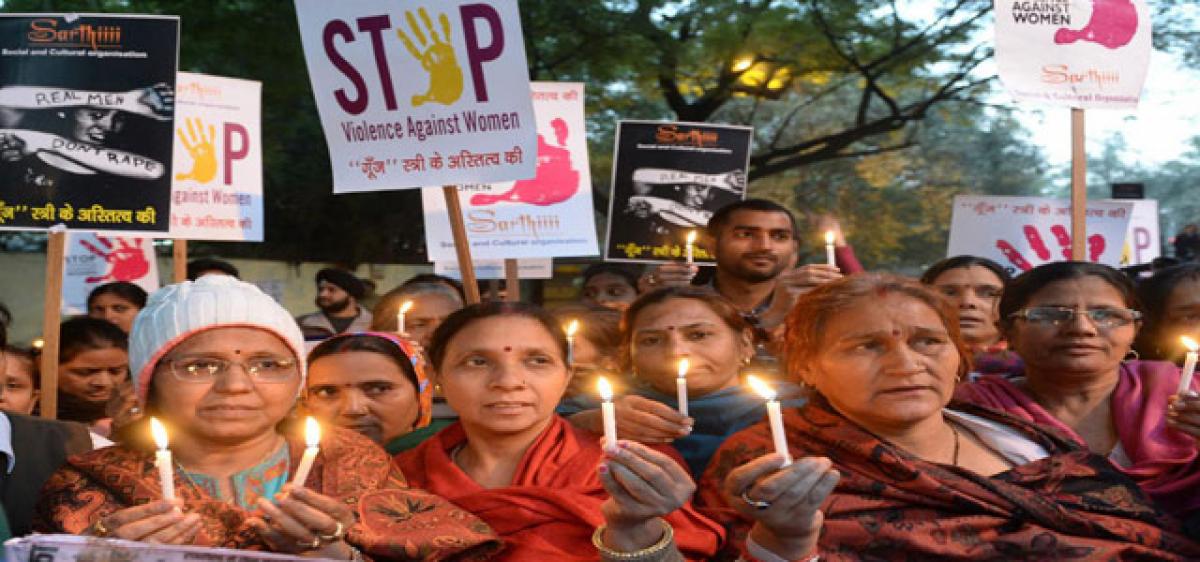Live
- Telangana Government Announces Rs. 5 Lakh Compensation for Families of Gulf Migrant Workers
- Grand Celebration of Dasara Festival on the 5th Day – Bhadrakali Goddess in Skandamata Ornamentation
- CM Revanth Reddy Urges Young Engineers to Lead Musi River Revitalization at TGPSC Event
- UTF District Branch Demands Immediate Implementation of the 12th PRC
- Dark-Humor Thriller 'Snakes & Ladders' Set for Global Premiere on October 18
- Kadapa Municipal Corporation Holds Public Grievance Redressal Meeting
- IAF set to celebrate its 92nd Raising Day
- Children should taught about importance of wildlife: MP Governor
- ‘Rising Rajasthan’ pre-summit of Mines Department to be theme-based
- CBI files interim report before Delhi High Court in coaching centre deaths
Just In
Jyothi Singh deserves much more than celebration of verdict


The celebratory, self-congratulating noise going around after the Supreme Court’s decision on Friday upholding the death sentence to the convicts of the 16 December, 2012 gangrape and murder case leaves one with a sense of dismay.
Stringent legislation and punishment alone may not be sufficient for fighting increasing crimes against women. In our tradition-bound society, certain attitudinal and change in the mind-set is needed to respect women and to ensure gender justice. Right from childhood years, children ought to be sensitised to respect women
The celebratory, self-congratulating noise going around after the Supreme Court’s decision on Friday upholding the death sentence to the convicts of the 16 December, 2012 gangrape and murder case leaves one with a sense of dismay.
No, it has nothing to do with four people from the underclass facing the noose or the courts not acting in a similar fashion in several such cases where there’s no intense public and media pressure. There can be no sympathy for the culprits and from the judicial point of view it is not easy to treat all similar cases as same.
But before the celebration dies down, the questions that should be troubling the collective conscience of the nation are these: Has justice been delivered to the victim? Was the hanging of the culprits the singular objective of the nation's fight for her? The answers need to be nuanced. And nuances, one is afraid, have little space when the public lust for revenge overwhelms everything else.
Jyoti Singh's case was much more than data in police records. It represented a wider issue: Women’s safety, not only in Delhi but all over the country. Close to five years after the unfortunate incident, have we made any progress in the direction of the broader goal? Read the city pages of newspapers. Note the frequency with which the words rape and molestation make it to the headlines. It tells you nothing has really changed on the ground. If anything, things have gotten worse.
In her judgment, Justice R Banumathi, part of the three-member bench which heard the case, gets the perspective right: “A total of 3, 27, 394 cases of crime against women were reported in 2015, an increase of 43 percent in such crime since 2011 and 110.5 percent over the past decade.” She was quoting from the National Crime Records Bureau statistics. Of course, we don’t need the bureau to tell us this. Our everyday experiences inform us much better.
No matter how much we celebrate, the reality is this: In handing down the death penalty for the culprits in this case and other cases, we are treating the symptom and not the disease. If the provision of the extreme punishment deterred crimes against women, we would not have people committing such acts. If the country was really serious about safety of women, the central point in the matter, it would not stop at a only a harsh legal provision.
How does it help the rape victim when the people that violated her go to jail or are hanged? Is it justice enough given all the mental trauma and personal and social consequences she has to endure for the rest of her life? It is difficult to understand how punishment equals justice. In our enthusiasm to seek revenge we tend to conflate the two. An intelligent society would work towards stopping the creation of victims more than ensuring punishment to the perpetrators.
Justice Banumathi makes as much clear. “Stringent legislation and punishment alone may not be sufficient for fighting increasing crimes against women. In our tradition-bound society, certain attitudinal and change in the mind-set is needed to respect women and to ensure gender justice. Right from childhood years, children ought to be sensitised to respect women...” she says in her judgment.
After the 2012 gangrape, there was a tremendous public show of sympathy for the victim. However, the respect for women in our society has not increased. Statistics tell the real story. One simple solution: Have more policemen around. Their visibility itself deters crime. Nothing has changed on this front. Curiously, there is no such demand from activists and other individuals hyperventilating on women's safety.
It is easy to blame the patriarchal society and our mindset for crimes against women. Knowledgeable members of the civil society and women activists won't stop reminding us of that. The counterpoint: This is how our society has been for centuries. How then can you expect society to change in a jiffy?
The solution: Like the learned justice says, taking the message of gender equality and inculcating it deep in our children. The first task in this regard is to sensitise people through all means, including education. One also does not notice much publicity given to laws regarding crimes against women. Why aren't we using the media for this? Policing also has to improve. Immediately. Who is going to demand that?
Jyoti Singh would not be very happy with people celebrating the verdict. She deserves better.
By: Akshaya Mishra
This article was first published at http://www.firstpost.com. Reprinted with their permission

© 2024 Hyderabad Media House Limited/The Hans India. All rights reserved. Powered by hocalwire.com






